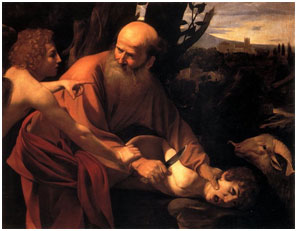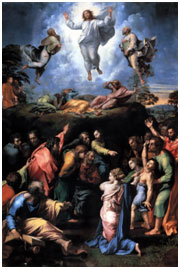Homily for Second Sunday of Lent, Year B

Homily for Second Sunday of Lent, Year B
St Mary’s Cathedral, Sydney, 1 March 2015
Human sacrifice. It conjures up images of Aztecs tearing hearts from poor victims in bloody rituals. Not that such things were the monopoly of ancient Mexicans: they were found in many cultures. Even today there are stories: of an Indian couple whose tantric advised them to kidnap, mutilate and kill a boy so they might conceive one of their own; of Bangladeshi workers whose fortune teller advised them to improve their bricks by killing a man, mixing his blood with the clay and putting his head in their kiln; of vigilantes in PNG and Tanzania accusing women of witchcraft or possession and burning them alive; of a recent resurgence of child sacrifice in Uganda; and of the evil ‘Islamic State’ organisation beheading hostages for an internet audience…
In our first reading today, Abraham receives a deeply disturbing test from God (Gen 22:1-18). Having long craved and finally been given a beloved son, from whom would descend the great nation of Israel, he is told to sacrifice the boy. What on earth, we might wonder, is going on here? Is God commanding or condoning human sacrifice and the genocide in prospect of the Jews?
Clearly not. The story itself makes it clear that whatever Abraham thought God was asking, God wasn’t going to let him do such a thing. Because the God of Israel knew all things in advance, the Jews understood this story to be not about God’s cruelty but about Abraham’s willingness always to put God before his own preferences; indeed for the Jews the story served to highlight the absoluteness of reverence for life.

What’s more, the Bible is full of injunctions against killing the innocent, and especially against child sacrifice, which was seen as a pagan abomination; Scriptural stories and teachings must be interpreted against the background of the whole Bible and, for us Christians, especially in the context of Christ’s teaching.
A third reason not to read today’s story as condoning child sacrifice is because it is against our Catholic tradition, and Scripture is always to be read within the tradition of the Church and according to right reason. Logic says atrocities are immoral; our faith tradition says they anger rather than appease God. In his famous Regensburg Address, Pope Benedict XVI showed how violence, superstition and other irrationality are contrary not just to God’s express will but to His very nature and ours. Humans cannot control God or their fate by talismans, fortune-tellers or bloody rituals. God is Master of the future, not us, and it is by His law of faith and reason that we must live.
To say Christianity condemns ritual sacrifice, however, is not to say it is against all sacrifice. In our epistle today, St Paul observes that God did not spare His only Son but offered Him up as gift for our sake (Rom 8:31-4). As St John put it: “God so loved the world He gave His only Son” (Jn 3:16). Abrahams’s answer to Isaac, when the boy asked where the sacrifice was, was evasive but unwittingly prophetic: “God will provide the lamb of sacrifice,” he said (Gen 23:7-8). Prophetic: for in due course God did provide the innocent Lamb, the only Son, Jesus. Only this makes sense of the story – for Jesus is God’s answer to the endless cruelty of man to man, to the irrationality of sin and death. No dumb animal, no kidnapped child, no hostage of superstition, but God offering Himself as one of us, that the world might be reconciled to Him (Jn 10:18). The once-for-all sacrifice of Good Friday did away with animal sacrifices, child sacrifices and the rest – replacing them with the timeless self-offering of our High Priest (Heb ch 10). That is what is re-presented on our altars: not another Isaac dragged to Moriah, but Jesus in whose self-offering we may participate every time we go to Mass.
The risk is that while the ancients thought they had to do things – bizarre things – to please the gods, we can think: oh well, it’s all been done, done by Jesus and done for me; I can be passive now, I can sit back and enjoy. No: sacrifice, as I said, is central to Christianity. Not just the all-sufficing sacrifice of Christ but the self-sacrifice this inspires and enables for His followers. We are not called to watch Christ’s cross pass by, like those who watched the first via crucis in Jerusalem; no, we are called to take up our cross and follow Him (Mt 16:24 etc.). St Paul thought his own sufferings somehow ‘completed’ Christ’s and he offered these up for the good of the Church (Col 1:24). God respects our personhood so much that, rather than imposing His sacrifice upon us as our ransom from sin and death, He invites us to join our own sufferings to Christ’s and ‘offer them up’ through Him and with Him and in Him. In this way we can participate in the mystery of Christ’s sacrifice and make it our own.

The story of Abraham, like that of the Cross, challenges us as to how central God is in our lives. Do we merely go through the motions or do we say to God by our prayers and deeds: you are my God; with all my being I want to know and love and serve you? I want to know and do your will; help me to be and do what you want. I offer you my little sacrifices, above all the sacrifice of my will, to be joined with the Eucharistic offering. Transform me with the bread and wine today. Make me, too, more and more part of the Body of Christ and of His once-for-all offering to You.
Listen to the Audio: http://www.xt3.com/library/view.php?id=18119&categoryId=36&episodeId=2240
References:
1.http://www.boston.com/news/world/articles/2003/11/29/in_india_case_links_mysticism_murder/
2.http://www.dailymail.co.uk/news/article-1259736/Man-beheaded-redden-bricks.html
3.http://news.discovery.com/human/psychology/seven-accused-african-witches-burned-to-death-141011.htm; http://news.yahoo.com/witch-hunts-papua-guinea-linked-jealousy-054301668.html; http://www.theglobalmail.org/feature/its-2013-and-theyre-burning-witches/558/
4.http://news.bbc.co.uk/2/hi/programmes/newsnight/8441813.stm
5.Against murder: Ex 20:13; Dt 5:17; Lev 24:17; Prov 6:17; 1Jn 3:12; Rev 21:8 etc.; against child sacrifice: Lev 18:21; 20:2-5; Dt 12:31; 18:9-14; Ezek 16:20-1; 2Kgs 17:17-8; 21:2-6; Jer 7:30-2 etc.
6.http://w2.vatican.va/content/benedict-xvi/en/speeches/2006/september/documents/hf_ben-xvi_spe_20060912_university-regensburg.html

